How ‘Vacation Interfaith School’ Helped Build Connections in Maryland
September 14, 2022
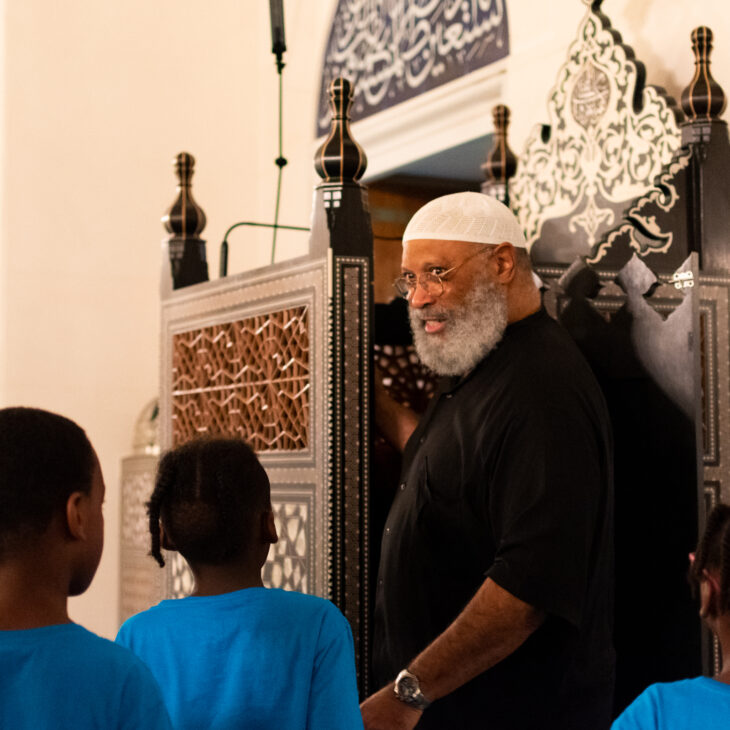
On a Thursday evening in early August, Tameeka Washington found herself standing outside the mosque on the Diyanet Center of America campus not far from her home in Bowie, Maryland. It was the second night of her latest project — “Vacation Interfaith School” — and she and a group of young students were eager for a tour and to learn a few things about how Muslims live out their faith.
Washington first moved to Bowie with her husband in 2009. At the time, she had no idea she’d become a grassroots organizer, much less one who started an interfaith summer camp and worked shoulder-to-shoulder with faith leaders and community members from different traditions.
But in 2020 as the pandemic started to take hold all around the world, she heard a calling. The message was somewhat vague. “I was like, we need to do something,” she said. “But I didn’t know who we was.”
As a Seventh-day Adventist, she often finds herself being guided by a need to serve in the here and now. “I can’t not help. My faith is a big part of why I do that and what my understanding of who God is.”
That summer, as large protests against the murder of George Floyd began to unfold in neighboring Washington D.C., and beyond, she found herself wanting to join the public outcry but had some concerns. “Folks were headed to D.C., and I was like, we’re still in the middle of a pandemic. That seems crazy,” she said.
So she reached out to her local city officials and with their support organized a vigil for the residents of Bowie. Among those who spoke out against racial violence that Saturday night in June were community members as well as city and state officials, local law enforcement and clergy.
Share
Related Articles
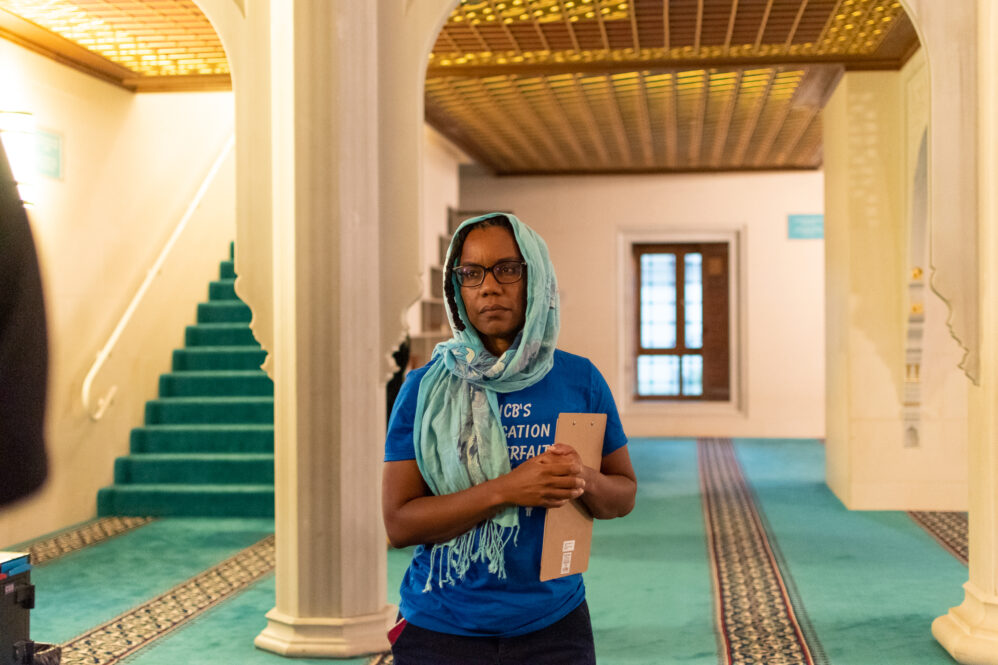
Tameeka Washington, President and Founder of Interfaith Coalition of Bowie, visits Diyanet Center of America, August 2022. (© Shelby Swann Photography)
Stephen Weisman, rabbi of Temple Solel, a Reform congregation, was one of the clergy who spoke. He met Washington for the first time that evening and was impressed with her organizing skills. The two became friends. This fortuitous encounter between an Adventist and a rabbi quickly evolved from friendship to professional collaboration and today Washington jokingly refers to Weisman as her co-conspirator in community organizing.
Three weeks after the vigil, Washington organized an online panel discussion to talk about faith, race and social justice. In addition to city leaders, Washington invited Christian, Muslim and Jewish clergy, including Rabbi Weisman, to speak to the community about their concerns.
“I know for me the question is, where’s God in all of this?” she said. “If I have these questions, somebody else has this question. So let’s see if we can’t get some answers for folks.”
The event was a success and fueled her desire to do more. It also helped crystalize her vision for how to best give back. She credits Rabbi Weisman for helping realize her calling. “I told her what we need is a lay led organization that is going to help bond clergy together during moments like this,” he said.
In 2020 she launched the Interfaith Coalition of Bowie.
Today the coalition provides a platform for a diverse group of faith leaders and community members to come together in the name of social justice as agents for change. Even amid a pandemic, they have been a regular presence in the public square these last two years.
The faith oriented online panel discussions continue and cover a range of timely issues: faith and critical race theory; fostering inclusive community for LGBTQ youth in religious spaces; autism and religion; and science-based information about the COVID-19 vaccine to name but a few.
The Rev. Emily Holladay, a pastor at Village Baptist Church, is among the clergy who is part of the interfaith coalition. “How many people do you know who say, I’m not a clergy person, I just go to church,” she said. “But I want the clergy to come together because I think they can have an impact on the community.”
With hate-based violence and extremism on the rise nationally, it’s this kind of community building that cities as diverse as Bowie are primed for.
According to the 2020 U.S. Census, of Bowie’s 58,000 residents, 56% are Black, 32% are white, 7% are Hispanic and 4% are Asian.
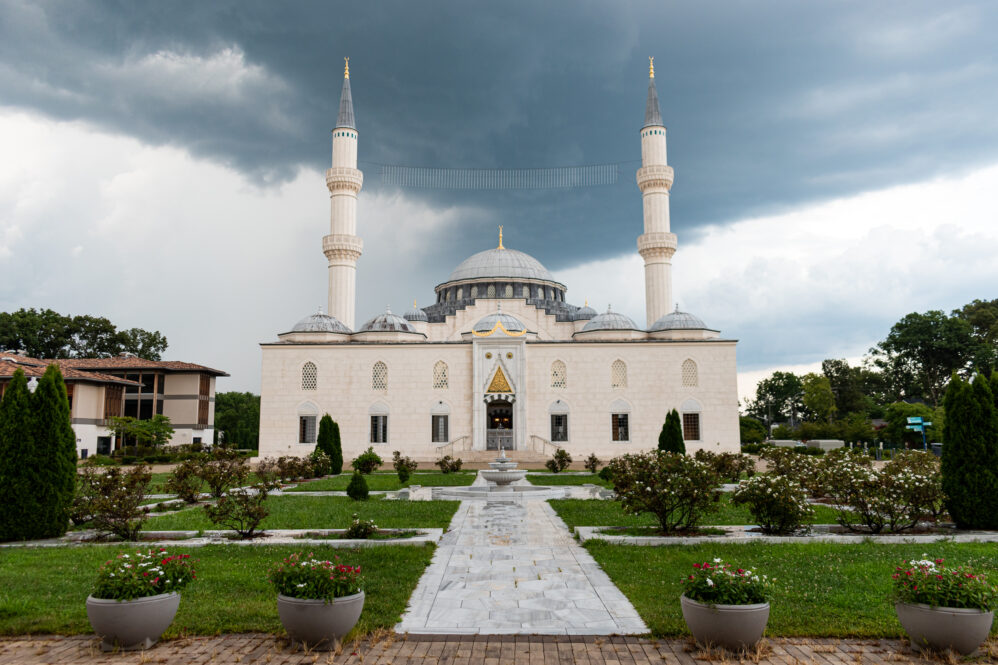
Storm clouds clear over Diyanet Center of America in Lanham, Maryland, August 2022. (© Shelby Swann Photography)
Bowie State University is one of the country’s 10 oldest historically Black colleges. Earlier this year the school was among a number of historically Black schools across the country that received bomb threats during Black History Month. Students were forced to shelter in place.
Around the same time antisemitic flyers appeared in neighborhoods across the area.
In response, the interfaith coalition Washington founded sponsored a “Bowie United for Peace” rally where city officials, community leaders and clergy presented a united front denouncing the incidents. Representatives from Bowie State were also on hand. Dr. Rhonda Jeter, Dean of the College of Education at Bowie told local media, “I’m excited for all of the people pulling together in the community and the faith groups, I think it’s really good.”
Creating opportunities for people to come together in the name of a more tolerant and just society is a big motivator for Washington, but she’s equally passionate about reaching the community’s younger population.
This summer the coalition organized a three-day summer camp for 8 to 12-year olds and called it “Vacation Interfaith School.”
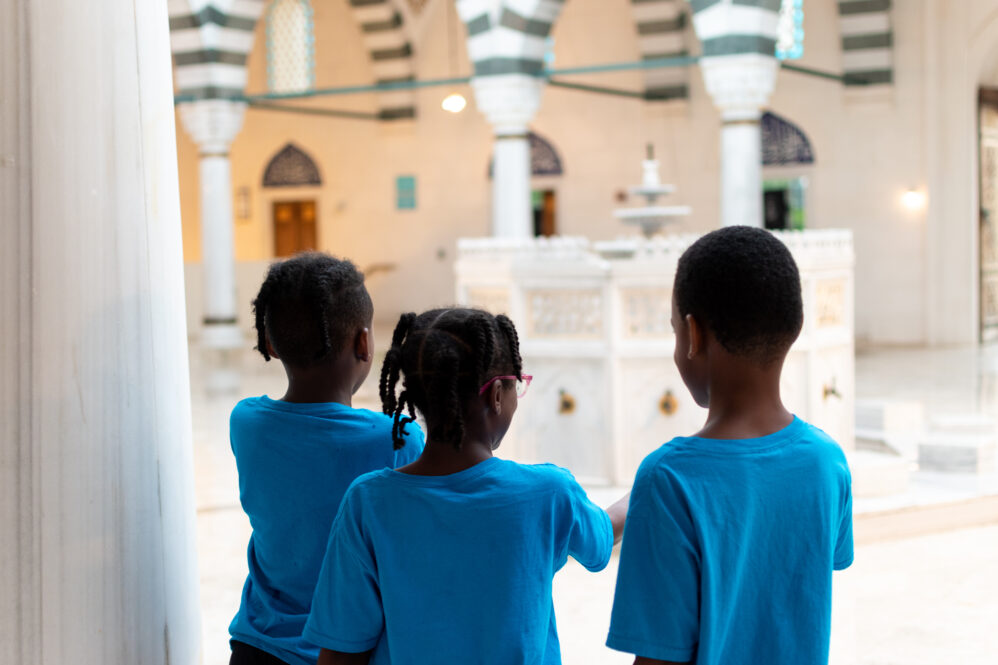
Vacation Interfaith School students, Noah Lee, Hannah Deacon, and Aaron Washington, in the mosque, August 2022. (© Shelby Swann Photography)
Rabbi Weisman, who has run Jewish summer camps in the past said, “Vacation Bible schools have a significant place in the Christian community. But it’s a silo building exercise, because every church runs their own.” Weisman contends that a camp like this one not only emphasizes a shared understanding among those of different faiths (or none), but it also has a way of breaking down silo walls.
The kids visited Village Baptist Church in Bowie, hosted by the Rev. Holladay, the Diyanet Center of America in neighboring Lanham, and United Parish of Bowie, a Presbyterian USA and United Church of Christ congregation.
For the visit to Village Baptist, Holladay organized a scavenger hunt in the church and allowed the kids to play the organ and stand on the pulpit. She showed them the baptistry and explained its purpose and what made it unique to Baptists. At the mosque the children learned about why Muslims pray five times day and when.
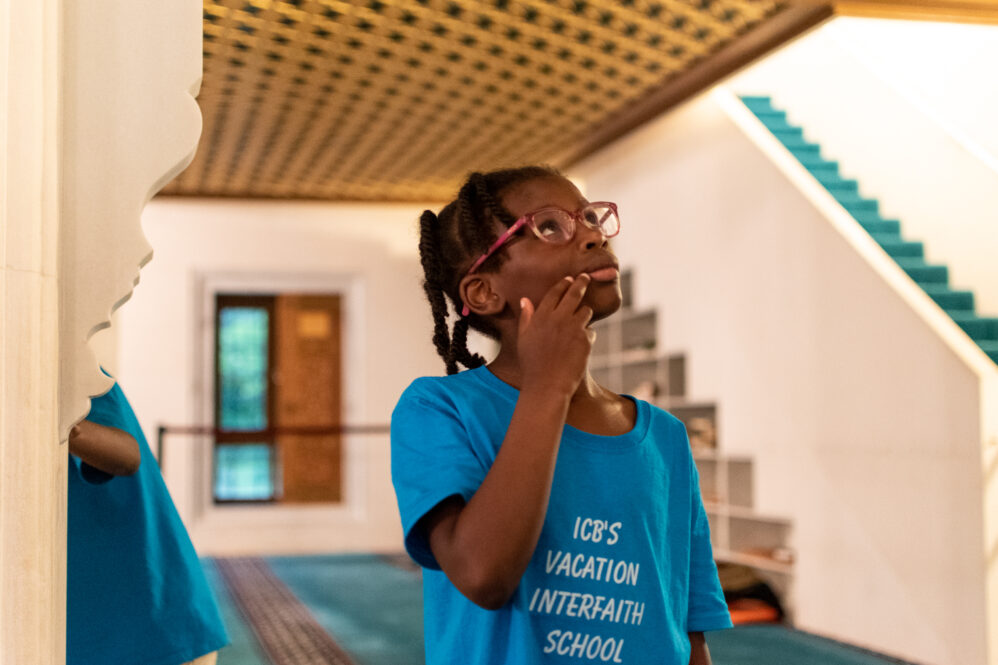
Vacation Interfaith School student, Hannah Deacon, watches women proceed to the balcony for prayer, August 2022. (© Shelby Swann Photography)
“One of the little ones was asking about the baptismal pool, was it a hot tub?” Washington said, laughing. “But I think having the kids in different sacred spaces without it being a service and being able to move around and ask questions and touch things was really helpful.”
While the curriculum remained loose for the inaugural version of the camp, Washington wants to build on what they learned worked and what didn’t and plans to offer it again next summer.
Despite working full-time and raising two kids who are 8 and 14, Washington is eager to continue the work and find opportunities for collaboration. The Bowie interfaith coalition recently partnered with another non-profit raising money for an Afghan family who have come to the area as refugees.
In creating the coalition, Washington has come to realize why this kind of engagement is necessary at times like these. “(Before this) there were things happening in my community and I was sleepwalking through it,” she said. “I’m so focused on making sure that my kids are okay, my husband’s okay, that I’m okay. I want to make sure that not only are we okay, inside our house, but the folks around us are okay, because those are our neighbors, right? And we all need to be good.”
Interfaith Coalition of Bowie, Maryland
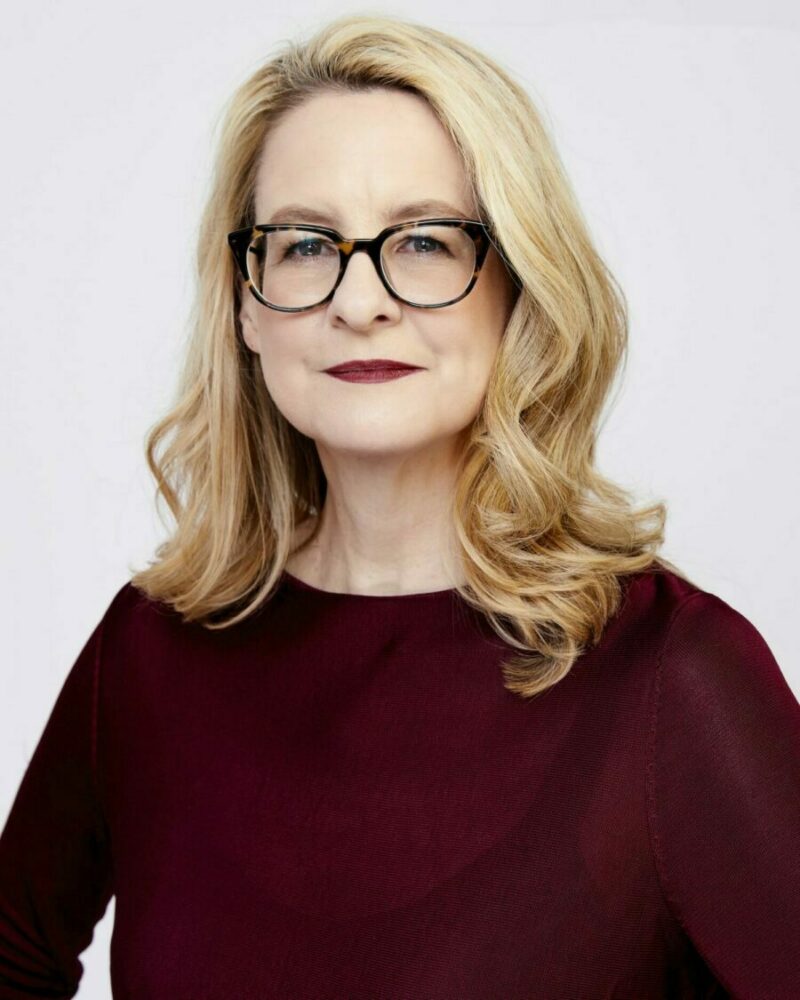
Liz Kineke
Liz Kineke is an award-winning journalist and television producer. During her 14-year tenure as producer and writer for the CBS Religion & Culture series she created 45 half-hour shows that looked at faith and religion as they relate to racism, white supremacy, climate change, immigration, and cultural heritage, among other timely issues. Her most recent reporting can be found in Religion News Service (RNS), Tricycle: The Buddhist Review and AP Global Religion.
She is the recipient of seven Religion Communicators Council Wilbur Awards and three Religion News Association awards. She also received a Henry Luce Foundation Public Theologies of Technology and Presence grant. She lives in New York City with her cat Ziggy.



